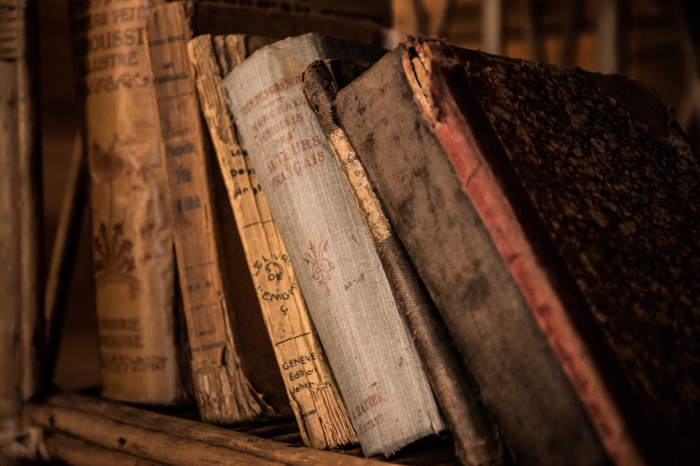
I’m a reader, as well as a writer. I think reading is essential for writing, and I was raised in a house filled with books. The library was practically a second home, especially after I started volunteering there when I was twelve. I can get lost in bookstores, particularly those of the used book variety which feel like they could possibly be magical (like the ones in Terry Pratchett’s novels).
My parents didn’t bother to limit much of my reading; the Babysitters’ Club books were banned for a few years because they thought the books were giving me nightmares (so I snuck them at my grandparents’ house instead), but mostly they encouraged me to read whatever I wanted. They stopped checking on what I was reading once I hit eleven or so because they trusted me to make good decisions. Of course, I didn’t always. I kind of regret all the crappy Christian romance books I read, but hey, at least my taste has improved and I now go for semi-crappy secular romance books that actually have sex scenes that aren’t of the fade-to-black variety.
Fantasy was always a favourite choice for me, and that hasn’t changed as I’ve become an adult. One of the first chapter books I remember my mother reading to me was The Lion, the Witch, and the Wardrobe, followed by The Hobbit. We worked our way through the entire Chronicles of Narnia and the Lord of the Rings, and I re-read those books frequently throughout late grade school and high school. I picked up some of the classics of children’s fantasy, like George MacDonald’s At the Back of the North Wind and E. Nesbit’s The Five Children and It.
I gravitated towards Diana Wynne Jones and read everything by her the library had, including her one fantasy novel for adults which, at age thirteen or so, really freaked me out. I keep meaning to track it down and re-read it again; I think I’d appreciate it more now. I own many of Tamora Pierce’s books, including the Immortals quartet and most of the Circle of Magic series, which often incorporate circle work as part of magical practice. I stumbled across Ann Downer’s Spellkey Trilogy in the fantasy section of the children’s library and read it over and over and finally tracked down a copy of all three books in one volume.
Sorcery and Cecelia (Patricia C. Wrede and Caroline Stevermer) introduced me to concept of charm bags; Sunshine taught me about the messiness of magic and Spindle’s End taught me about how it has a mind of its own (both by Robin McKinley). LeGuin’s A Wizard of Earthsea showed me that magic has consequences. The retellings of the legends of Arthur which I steeped myself in revealed a magical world that could be as dark and dangerous as it was delightful and beautiful. And Neil Gaiman’s American Gods gave me a new understanding of deity that I’d never considered before.
Oh, and Harry Potter. Of course I read Harry Potter. I loved the series until the fourth book came out. When I got my hands on a copy, I freaked out a quarter of the way in when Mad-Eye Moody (but really Barty Crouch, Jr.) demonstrates the Unforgiveables to Harry’s class. I slammed the book shut, returned it to the library, and avoided the series for years until I was in grad school, when a friend convinced me to finish reading it. And then I fell in love with the weird magical world of Harry Potter all over again. I dislike how Rowling’s magical system isn’t much of a system and how it’s effortless unless it needs to be hard for the plot, but the world itself has characters that I keep returning to.
I read, and read, and gravitated towards the fantasy section, even though I was sometimes afraid to pick up something by an author I wasn’t familiar with. I read a number of Jim Butcher’s Dresden Files, and some of Mercedes Lackey’s books, though I haven’t yet gotten to her Valdemar series. I was a little weirded out by The Mists of Avalon, no matter how much I love Arthurian retellings (I read it in a fit of delayed rebellion as an adult, since that was one of the few books my mom didn’t want me reading when I was a teenager). Beowulf loves Terry Pratchett, so we have a shelf full of his books, and while not all of Pratchett’s works resonate with me, I adored the ones with Granny Weatherwax and her coven.
Magic, I learned was not always biddable, did not always listen to its wielder, and yet offered an unparalleled connection with the world and its creatures. I wanted it to be real, but I didn’t really see how it could be. It did and didn’t fit with the world I knew, and while I wanted to experience magic, I settled for finding it stories and in the few moments that came to me that seemed magical. I was so fascinated by magic that I wrote a thirty page paper on different interpretations of magic in fiction for a semiotics course in grad school (which I now need to revise further before I send it on its merry way to see if a journal wants to publish it). It was glorious, doing my research with a stack of novels next to me.
And now here I am, reading about witchcraft, trying spells, and remembering that magic doesn’t always do what you want it to do, that it has its dark side, and that it requires work, patience, and concentration. I learned those lessons first from fiction.